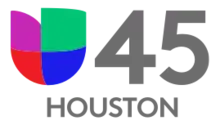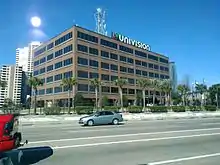KXLN-DT
KXLN-DT, virtual channel 45 (UHF digital channel 30), is a Univision owned-and-operated television station serving Houston, Texas, United States that is licensed to the suburb of Rosenberg. The station is owned by the Univision Local Media subsidiary of Univision Communications, as part of a duopoly with Alvin-licensed UniMás owned-and-operated station KFTH-DT (channel 67). The two stations share studios near the Southwest Freeway (adjacent to the I-610/I-69 interchange) on Houston's southwest side; KXLN's transmitter is located near Missouri City, in unincorporated northeastern Fort Bend County.
 | |
| Rosenberg/Houston, Texas United States | |
|---|---|
| City | Rosenberg, Texas |
| Channels | Digital: 30 (UHF) Virtual: 45 (PSIP) |
| Branding | Univision 45 (general) Noticias 45 Univisión (newscasts) UniMás 67 (on DT2) |
| Slogan | Siempre a tu lado (Always on your side) |
| Programming | |
| Affiliations |
|
| Ownership | |
| Owner | Univision Communications (KXLN License Partnership, L.P.) |
| TV: KFTH-DT Radio: KAMA-FM, KLAT, KLTN, KOVE-FM, KQBU-FM | |
| History | |
| Founded | August 2, 1984 |
First air date | September 18, 1987 |
Former channel number(s) |
|
Call sign meaning | K - EXceLleNce |
| Technical information | |
Licensing authority | FCC |
| Facility ID | 53847 |
| ERP | 1000 kW |
| HAAT | 592 m (1,942 ft) |
| Transmitter coordinates | 29°33′45.2″N 95°30′35.9″W |
| Translator(s) | KFTH-DT 67.5 (36.5 UHF) Alvin |
| Links | |
Public license information | Profile LMS |
| Website | Univision 45 |

In addition to its own digital signal, KXLN is simulcast in high definition on KFTH's fifth digital subchannel (UHF channel 36.5 or virtual channel 67.5 via PSIP) from a separate transmitter near Missouri City.
History
Founded on August 2, 1984 by businessmen A.C. Peña and J. Adán Treviño, KXLN became the first Spanish-language television station in the Houston market when it first signed on the air on September 18, 1987. From the beginning, it has been affiliated with the Univision network. In September 1987, the station upgraded its transmitter to provide a full power signal, effectively expanding its coverage area to cover a larger portion of Southeast Texas. The station originally operated from studio facilities located along Kirby Drive, near the Astrodome.
The station was acquired by Univision outright in 1993; the company heavily invested in KXLN and made upgrades and improvements in every department. A number of reporters and anchors have been able to move on to positions for the network's news division Noticiero Univision, and several network newsmagazines.
Univision Communications acquired KHSH-TV (channel 67, now KFTH-DT) from USA Broadcasting in 2000; that station became the Houston charter station of Univision's new secondary network, Telefutura (which was rebranded as UniMás in January 2013) when it launched in January 2002; due to its co-ownership, some KXLN-produced programs and breaking news coverage may also air on KFTH. Later that year, Univision, in a multimillion-dollar purchase, bought a six-story building in Houston's Uptown district to serve as the studio facilities for KXLN, KFTH and several Univision-owned radio stations in the Houston area. The Univision-owned local properties moved into the building in 2006.
On January 26, 2019, KXLN changed frequencies from RF channel 45 to RF channel 30 as part of the Federal Communications Commission (FCC)'s spectrum repack.
Digital television
Digital channels
The station's digital signal is multiplexed:
| Channel | Video | Aspect | PSIP Short Name | Programming[1] |
|---|---|---|---|---|
| 45.1 | 720p | 16:9 | KXLN-DT | Main KXLN-DT programming / Univision |
| 45.2 | Unimas | Simulcast of KFTH-DT / UniMás | ||
| 45.3 | 480i | Escape | Court TV Mystery | |
Analog-to-digital conversion
KXLN-DT (as KXLN-TV) discontinued regular programming on its analog signal, over UHF channel 45, on June 12, 2009, the official date in which full-power television stations in the United States transitioned from analog to digital broadcasts under federal mandate.[2] The station's digital signal relocated from its pre-transition UHF channel 46 to channel 45 for post-transition operations.[3][4]
Eleven days later, all Univision owned-and-operated stations, including KXLN, permanently added a "-DT" suffix to their callsigns, in which the station changed from KXLN to KXLN-DT.
News operation
KXLN-DT presently broadcasts 17 hours of locally produced newscasts each week (with three hours on weekdays and one hour each on Saturdays and Sundays).

The station's news department was founded in 1988 when KXLN began producing news updates during Univision primetime programming; these eventually evolved into full 30-minute newscasts at 5 and 10 p.m. In 1993, KXLN debuted Houston's first Spanish-language morning news program, Houston Ahora, as well as an innovative late evening newscast called 15 Minutos. As the station grew in size and renown throughout the area and nationally, its newscast ratings have increased to the point of challenging several of the English-language stations during the quarterly ratings periods.
In 2003, then-news director, Deanna Schultz (formerly Landron-Reyes), formed one of the first Spanish-language investigative reporting franchises in the nation, "En Su Defensa" ("In Your Defense"); the segments later garnered regional acclaim, and Houston mayor Bill White even proclaimed an "En Su Defensa" month in 2004. Led by the investigative reporter Patricio Espinoza, the segment generated strong community following and historic ratings along with several awards. In 2004, 2005, and 2006, the investigative reports earned, KXLN several Emmy awards and nominations for the first time.
KXLN began broadcasting its local newscasts in high definition on July 22, 2010. The west and east coast flagship Univisión-owned stations, KMEX-DT in Los Angeles and WXTV-DT in New York City began broadcasting their local newscasts in high definition approximately a month before, featuring a brand new graphics package. On April 4, 2011, KXLN began airing a simulcast of its weekday morning Primera Edición newscast on and began producing another weekday morning news program, Vive La Mañana, for Telefutura (now UniMás) owned-and-operated sister station KFTH-DT. Like the newscasts on KXLN-DT, the programs are broadcast in high definition, within the station's current news set. Dallas-Fort Worth sister station KUVN-DT uses the same titles for their newscasts that it runs on sister station KSTR-DT; Vive La Mañana features a different graphics and music package that is shared by both stations.
On March 27, 2015, the station axed its morning newscast along with the UniMás show Vive La Mañana for a regionalized morning newscast titled Noticias Texas Primera Edicion that will air on Univision stations in Dallas, Houston, San Antonio, and Austin. Regionalized newscasts will be anchored by Karina Yapor and Rodolfo Sanchez who work at sister station KUVN-DT, whose morning show was also canceled upon being relocated to Houston. KXLN's morning anchors Lizzet Lopez and Arnold Rojas would both be removed as anchors. Morning weather anchor Laura Sierra will do live weather and traffic cut-ins during Despierta America and the regionalized newscast. The new regionalized morning news debuted on April 6, 2015; until then the station will use repeats of Noticiero Univision: Edicion Nocturna and entertainment programming. No layoffs happened.[5] Lopez is being moved to 10 p.m. as a reporter and Rojas is becoming the lead reporter in a new investigative unit.
Notable on-air staff
- Raul Peimbert – anchor
References
- "RabbitEars.Info". www.rabbitears.info. Retrieved November 21, 2018.
- List of Digital Full-Power Station Archived August 29, 2013, at the Wayback Machine
- Ellison, David (February 6, 2009). "Consumer Watch: Stations have more DTV work to do". Houston Chronicle. Retrieved November 21, 2018.
- "CDBS Print". fjallfoss.fcc.gov. Retrieved November 21, 2018.
- Villafañe, Veronica (March 31, 2015). "Univision cancels Dallas & Houston newscasts; launches regional Texas show". Media Moves. Retrieved November 21, 2018.
External links
- Official website
- KXLN in the FCC's TV station database
- BIAfn's Media Web Database -- Information on KXLN-TV